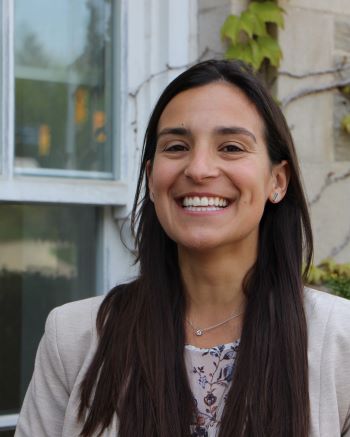On-farm learning helps veterinary students prepare for a career in livestock medicine.
From the city to the farm: Ruminant Field Services clinic inspires student veterinarians to work with livestock
![]()
While still a veterinary student, University of Guelph professor Dr. Rita Couto Serrenho planned to become a small animal veterinarian working with cats and dogs.
That was before she discovered livestock medicine.
Now, as a faculty member and epidemiologist in the Department of Population Medicine at U of G’s Ontario Veterinary College (OVC) and as a clinician with OVC’s Ruminant Field Services (RFS) clinic, Couto Serrenho hopes to inspire students to consider a similar path.
In the RFS clinic, which recently celebrated its 70th anniversary, fourth-year doctor of veterinary medicine (DVM) students build their confidence and skills on-farm.
The clinic provides routine and emergency visits for herds of beef and dairy cattle as well as small ruminants. A typical herd health visit might find RFS clinicians tending to sick animals, checking cows for pregnancy, disbudding calves or discussing data.

as a faculty member in May 2023.
First-, second- and third-year DVM students may also join OVC faculty, clinical veterinarians and doctor of veterinary science (D.V.Sc.) students in the rotation.
For one OVC graduate now working as a dairy veterinarian, participating in the RFS clinic during her first and second years let her “hit the ground running” in other rotations. Dr. Christina Lyn, a 2019 DVM graduate, says, “Hands-on experience with large animals as a student is huge. It’s a great opportunity. Students should take advantage.”
Lyn also says the faculty members involved with RFS act as mentors, pointing students in new directions to gain more experience tailored to their interests. “Being able to talk to them helped me figure out how to reach my goals,” she says.
Couto Serrenho tries to inspire students as much as possible. “Some students with an interest in livestock have never had the opportunity to work on a farm before,” she says. “I try to share my path and hopefully demonstrate that it is not about where you grew up but where you want to be.”
Research centres offer unique engagement opportunities
The RFS clinic serves local commercial farms and Agricultural Research and Innovation Ontario’s livestock research centres, which are managed by U of G through the Ontario Agri-Food Innovation Alliance.
Couto Serrenho says the Ontario Beef Research Centre and Ontario Dairy Research Centre offer students critical hands-on experience without the time pressures encountered on a private farm, which allows them to learn and practise diagnostic techniques and interact with staff.

Essential skills for the next generation of food animal veterinarians
Couto Serrenho ensures students are developing well-rounded, practical skills in data analysis, animal assessment and in-person communications to help them succeed in their future careers.
“If a cow has milk fever, you treat the cow, but you also want to see the herd’s history and what management changes prevent other milk fever cases,” Couto Serrenho says. “You look at the data to ask the right questions, to find out what caused the milk fever in the first place.”
Analyzing data also teaches preventive medicine and farm management skills, which can improve herd health and reduce treatment costs for clients.
Building relationships with producers is another unique benefit of the program.
Lyn, who grew up in an urban setting, says the opportunity to ask questions of clients was valuable.
In light of veterinary shortages affecting some rural and northern communities in Ontario, Couto Serrenho believes that giving students tools to succeed will have a great impact.
“It’s really rewarding to see them on day one and at the end of the rotation. You can see their confidence and skills grow. They feel like now they can do it.”
She adds, “What drew me to farm animals was my professors, so I want to be that person for somebody else.”
The Ontario Agri-Food Innovation Alliance funds the Veterinary Capacity Program (VCP), which includes contributions to OVC’s veterinary externship program, the Health Sciences Centre, the Centre for Public Health and Zoonoses, and D.V.Sc. research projects related to food animals and agriculture/rural topics. The Ruminant Field Services clinic is part of the Health Sciences Centre.
RFS by the numbers
- 25 commercial farms and 4 U of G-managed research centres benefit from RFS veterinarians.
- 30 fourth-year students participate in the RFS clinic each year on average.
- 2 D.V.Sc. positions within ruminant health management are funded through the VCP.